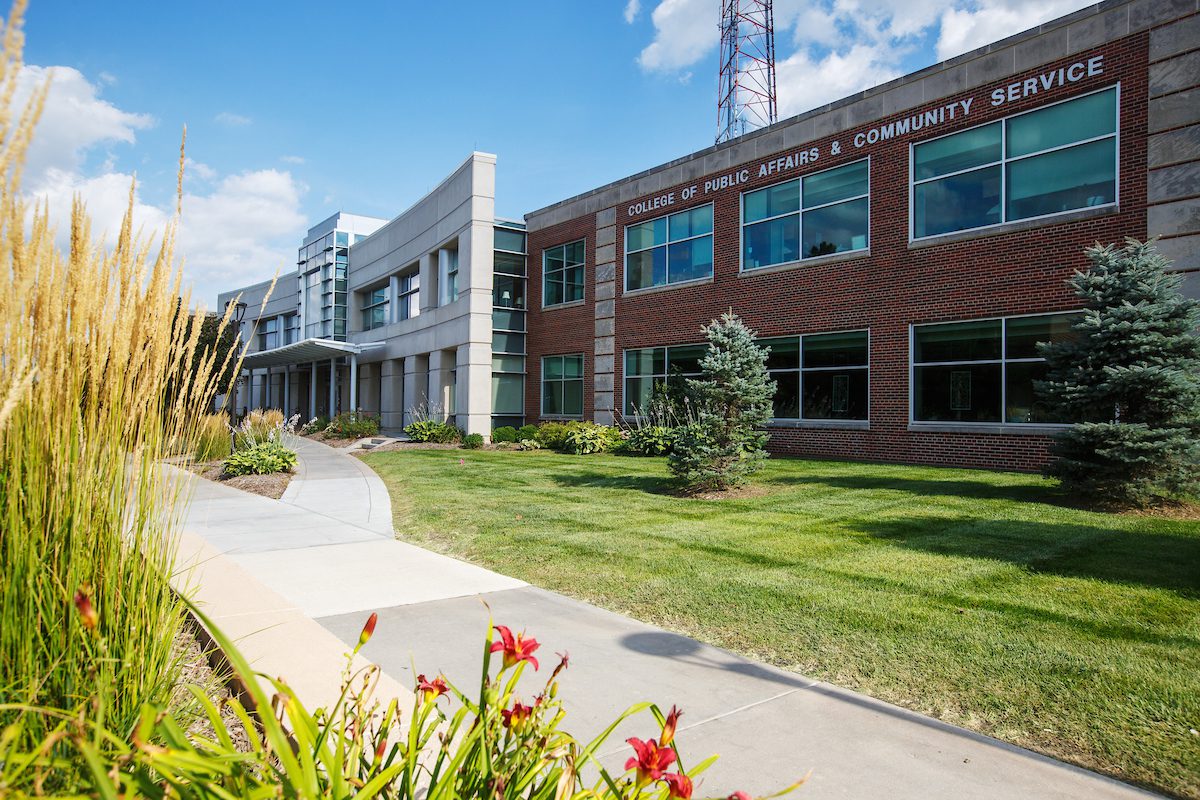
The UNO Fund - Public Affairs and Community Service helps meet the greatest needs of the college by providing crucial scholarship dollars to students in financial need, research awards to faculty, and travel support for students attending academic conferences, to name a few.
The College of Public Affairs and Community Service at the University of Nebraska at Omaha offers a wide range of pathways for students.
From criminology to aviation, every student is encouraged to pursue a degree that resonates with their passion while also contributing to the advancement of the surrounding community.
“I’m so proud to be this dean; we have a tremendous local community impact both through our students [and] through the research and community work that we do, so it’s a great place to be,” Gaylene Armstrong , dean of CPACS, said. “Our name speaks for itself — that we’re completely dedicated [to] supporting the community and advancing our community.”
The college offers a multitude of nationally recognized programs spanning undergraduate to master’s levels.
“We are always trying to ensure that we're at the cutting edge of knowledge and that we're mapping onto what employers and national global employers need from individuals who are graduating with degrees from our college,” Armstrong said.
With the college offering such a wide range of opportunities, a talented and dedicated staff is essential to maintaining accessibility and driving continued advancement in education. Thanks to donor support, the college has a higher retention rate for the faculty who are involved in further developing the college through research.
The college is not only able to better retain these faculty members but offer more opportunities to students in every degree because of the UNO Fund — Public Affairs and Community Service.
“It’s allowed students to travel to conferences, to both share their work and the work that’s going on at UNO, as well as to gain education and networking opportunities that they would not have otherwise received,” Armstrong said.
By supporting CPACS, you empower students and faculty to explore new projects and follow their dreams, whether in the justice system or as caregivers for elders in the community.
“When our donors give, whether it's to support our students, retain our faculty, or provide opportunities … it reminds us how integral we are to the fabric of Nebraska,” Armstrong said.
To help CPACS continue reaching new heights, please consider donating to the UNO Fund — Public Affairs and Community Service.
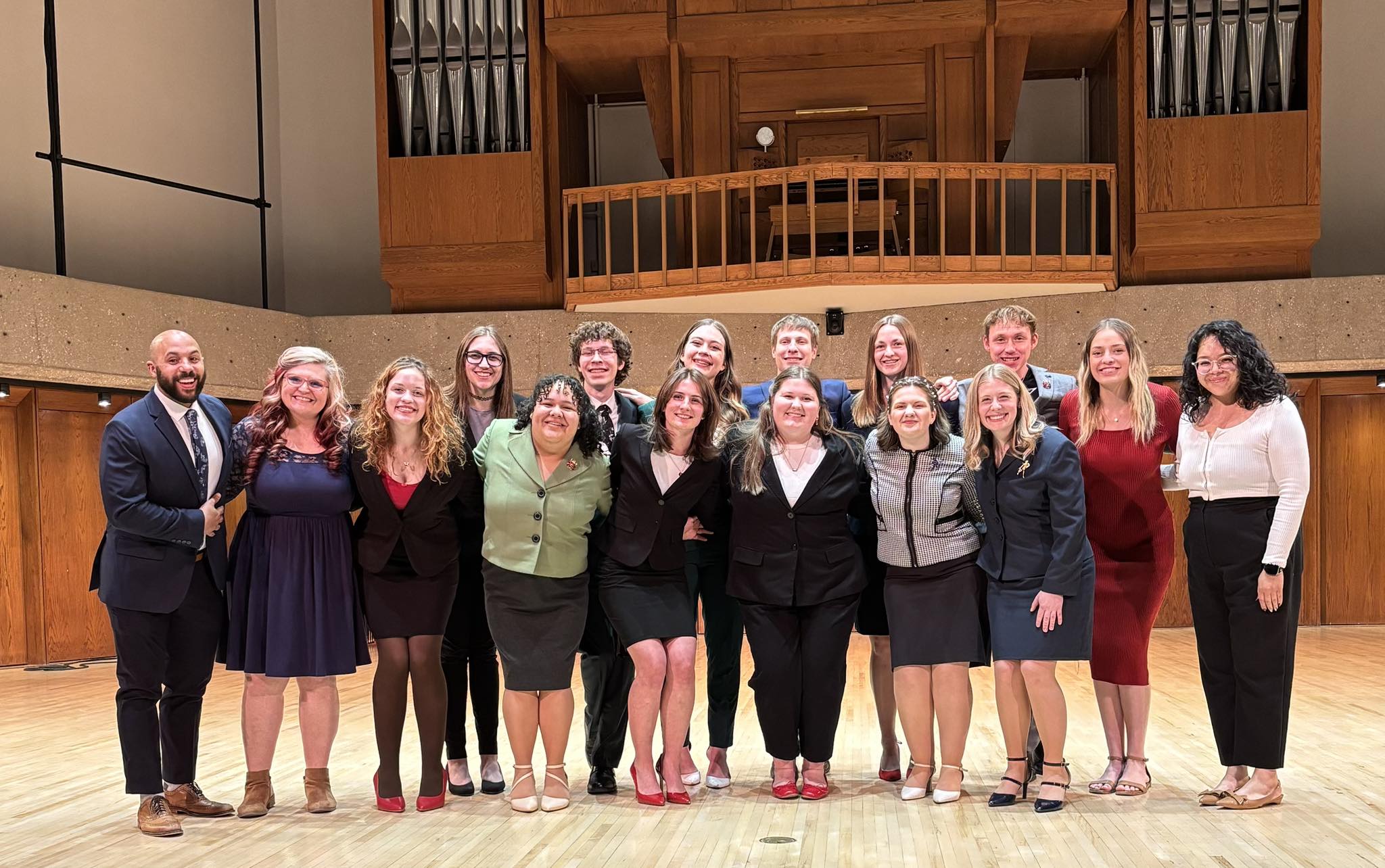
Your gift to this fund will decrease the financial burden on students involved in UNO MavForensics, allowing them to continue pushing the program to new heights.
At the University of Nebraska at Omaha, a powerful form of student expression is thriving.
It is not on the field or in a lab, but behind a microphone. The UNO MavForensics Team, a competitive speech and debate program, is more than just public speaking.
It is a life-changing experience for the students involved, and at the heart of it all is Amanda VonGoodrich, the program’s co-director.
“Forensics” often reminds people of crime labs, but its roots are far more ancient and poetic.
“Forensics comes from an old word meaning ‘truth telling,’” VonGoodrich explained. “It’s about oral advocacy and the power of words to inform.”
Under VonGoodrich’s leadership, the has blossomed into a nationally recognized group of students who compete in tournaments across the country and the globe.
“Last year, we competed in Ireland,” she said. “We are eyeing Greece in 2026.”
These high-level opportunities would not be possible without the support of the UNO Forensics Development Fund. The fund and donor support help cover travel, lodging, registration fees and supplies.
“Donor support directly goes back to students because it is the only way we can dream this big,” VonGoodrich said.
At its core, UNO Forensics is about giving students a platform to speak up and speak out. From social justice to pop culture, students craft speeches on topics they are passionate about. These students are not just thriving within the forensics community — they are setting standards across campus.
“They are typically the best of the best,” she said. “They are leaders in their classrooms, proactive thinkers, and future politicians, lawyers and educators.”
Contributions to the UNO Forensics Development Fund are vital to helping the MavForensics program continue to succeed.
“Those unfamiliar with the world of competitive speech, I invite you to follow us on social media or come to a showcase to see how hard these students work,” VonGoodrich said. “You’ll understand why it is worth supporting.”
For VonGoodrich, forensics is not just an extracurricular activity.
“There is no better student organization I can think of to donate to,” she said. “These students are extraordinary, and the support we receive truly changes lives.”
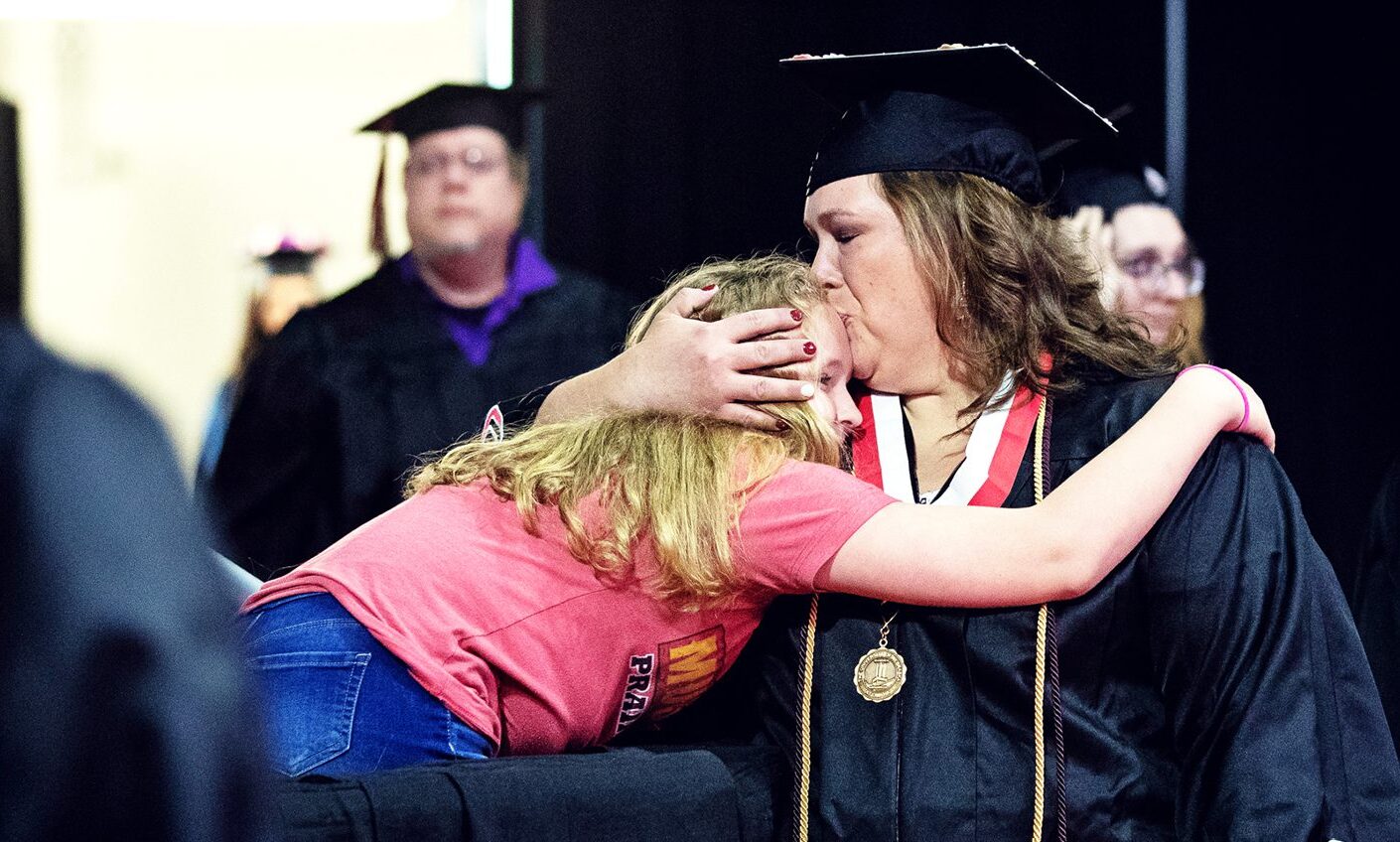
Gifts to this fund provide scholarship support for our general studies students, which includes adult education and our large military student presence.
The Division of Continuing Studies at the University of Nebraska at Omaha helps learners of all ages and stages in life pursue their educational goals and aspirations.
Often, nontraditional students can be overlooked when we think of the path to pursuing a college degree. Continuing Studies strives to be a central resource for these learners, helping no matter where they are in their educational journey.
“We always have wanted to meet learners where they are and then help them start or finish what they started,” Katie Sup Rezac, senior associate director of advising, outreach and engagement, said. “Our vision is to strive to do as much as we can for our learners, for the university, for the community by serving as a program of choice for adult learners.”
Every learner should get the same opportunity for success, no matter their aspirations. Through Continuing Studies, students meet with advisors to aid them in finding the best pathway to match their schedule.
“We call it FOIP: It’s fulfilling our institutional promise,” Sup Rezac said. “We have a strong belief that when we admit students to UNO, we are promising them that they'll graduate, and we're going to help them get to the end.”
Sup Rezac highlighted the diverse goals students have and the validity of everyone’s ambitions. She added that the goals of students within Continuing Studies often fall into different buckets, ranging from pursuing a degree or certification to simply pursuing knowledge and new skills.
“Both buckets are in lifelong learning and understand the value of education and what it means to them,” Sup Rezac said. “It’s just their end goal might be a little bit different.”
It can be intimidating to come back to college, but the Division of Continuing Studies strives to ease each student into it. That is why the division attempts to connect with the local community.
“[Our students] are our workforce in Omaha, and of course we have students all over the world, but the majority of students come from the Omaha area,” Sup Rezac said. “We engage with them to talk about what their needs are for employees, what they’re seeing with their current employees and maybe what degree programs we are missing or what our learners aren’t getting.”
The Division of Continuing Studies Fund for Excellence enables a greater impact on students by providing scholarships that offer the extra support needed for their success. Without this fund, meeting each student’s individual needs would be much more challenging.
“We are helping them pay down a balance or pay off a balance so they can start taking classes again,” Sup Rezac said. “A lot of times that’s the reason why students have to drop out is because they’re either not eligible for financial aid or they’ve met their max in financial aid, or they don’t take enough classes to qualify.”
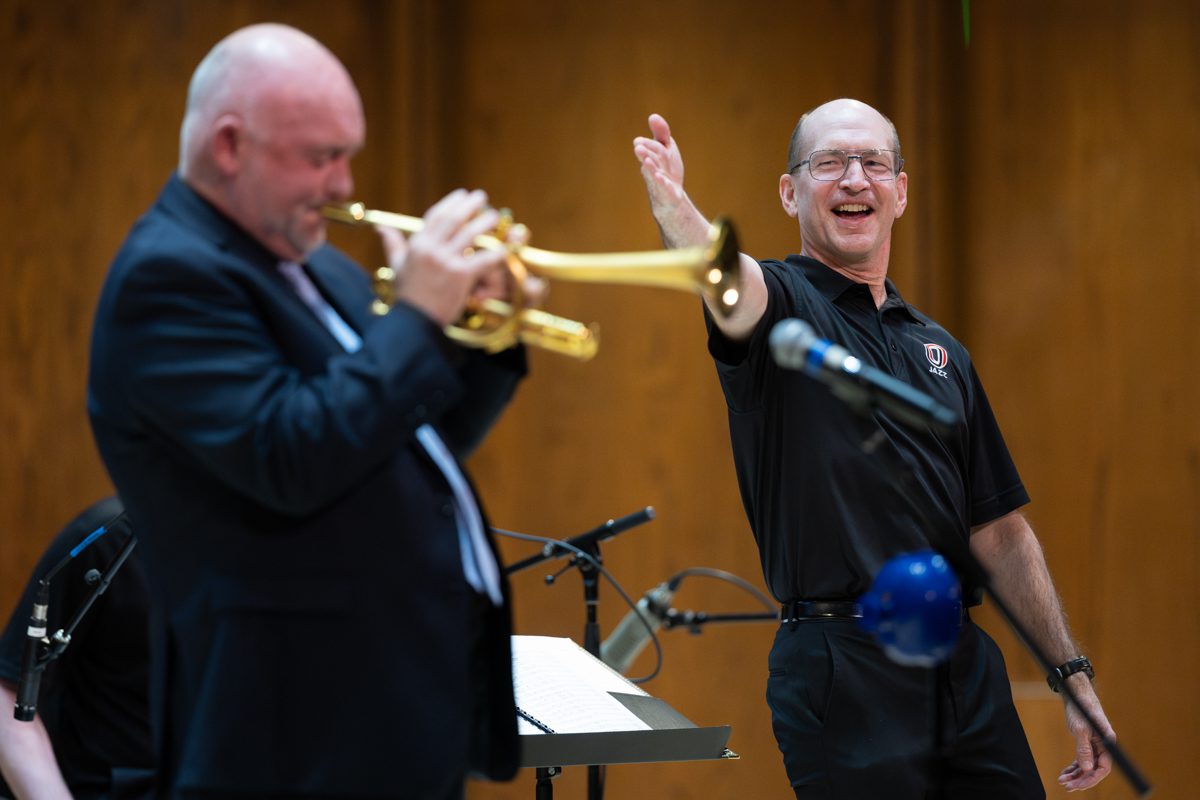
Support the next generation of jazz musicians at UNO by making a gift to the UNO Jazz Area Support Fund today.
For 25 years, Pete Madsen has shaped jazz studies at the University of Nebraska at Omaha.
As area coordinator for jazz studies within the College of Communication, Fine Arts and Media, he has nurtured the talents of countless young musicians and expanded the jazz program into a nationally recognized organization.
“My goal has always been to create opportunities for students and bring world-class jazz to Omaha,” Madsen said. “I want students to experience the same excitement I felt when I was their age.”
One highlight of the jazz studies program is its annual Jazz Festival. The festival, which debuted in 1973, has grown into one of the premier educational jazz events in the country.
This year, 56 bands from Nebraska, Iowa, South Dakota and Missouri participated in the festival. Students had the opportunity to perform and receive expert feedback from top jazz educators and performers. The festival also featured professional musicians from New York, Los Angeles, Israel, Portugal, Poland and Australia.
“It’s about more than just playing music. It’s about learning, networking and seeing what’s possible,” Madsen said.

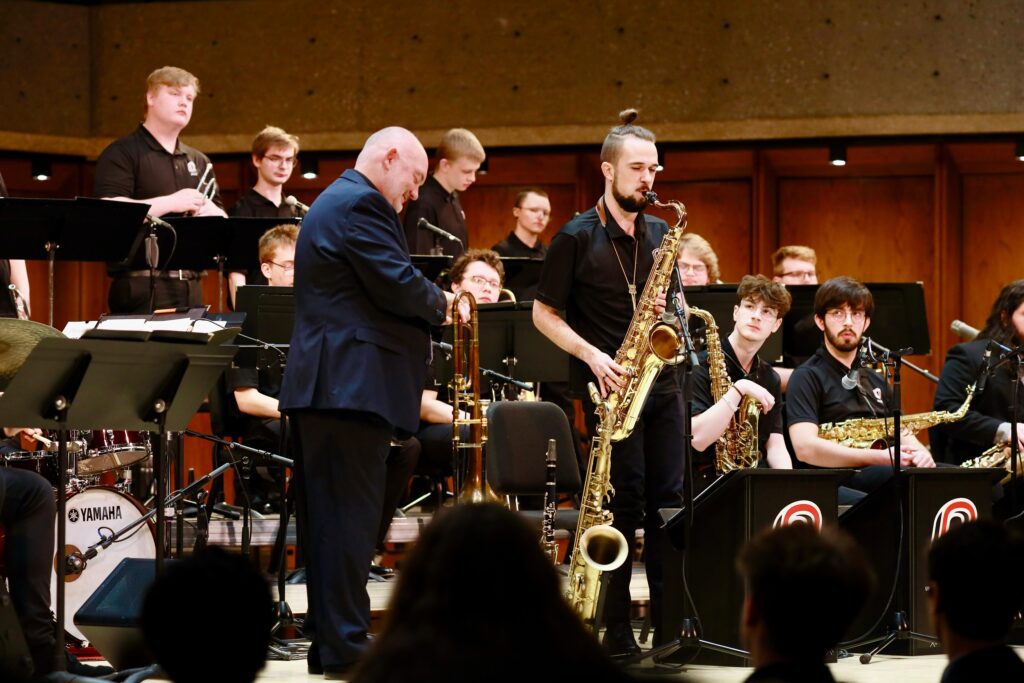

Donors play a vital role in the program’s success. The UNO Jazz Area Support Fund has allowed the festival to grow by bringing world-class talent to Omaha.
Recently, a generous philanthropic gift enabled the UNO Jazz Band to perform in Uruguay, leading to an invitation to play in Miami, Florida, with flutist José Valentino.
“Donor support creates a domino effect,” Madsen said. “It opens doors for our students and elevates our program.”
Beyond performances, donations also help fund scholarships, which are crucial for attracting top talent.
“We compete with other universities for the best students, and scholarships make a difference,” Madsen said. “We’ve been fortunate, but we still need more support to remain competitive.”
Madsen has big goals for the program, including getting the UNO Jazz Band to be selected for the prestigious Jazz Education Network Conference.
“Attending the conference would be a major milestone for us,” Madsen said. “It would show how far we’ve come and continue to raise our profile.”
Through his passion for jazz and dedication to his students, Madsen has built a thriving program at UNO. His students continue to pursue music careers, ensuring that the legacy of UNO Jazz will live on for years to come.
“When I see former students out in the world making music, it reminds me why I do this,” Madsen said. “This program changes lives.”
From scholarships and cutting-edge equipment to enhanced travel experiences and wellness resources, the One Fund is the backbone of the university’s commitment to providing an elite experience.

We know supporting your favorite Maverick team is important and your gift still can be directed to the sport or program you designate with The One Fund. The One Fund will make gift giving more convenient for you and more cost-effective for us.
Stepping into the Director of Hockey Operations role at the University of Nebraska at Omaha was a no-brainer for Zachary Vit. What made the position irresistible was the chance to work within a program supported by the One Fund — an initiative that has been a game-changer for the university’s hockey program and its student-athletes.
“I heard about the open position and reached out to the staff here,” Vit said. “I went through the interview process, learned a lot about the program and, in just a few weeks, everything fell into place.”
"It was an opportunity I couldn’t pass up."
Vit’s background includes coaching at several levels — junior hockey, Division III college hockey and, more recently, a prep school program in upstate New York. With a passion for coaching and an eagerness to continue learning, he was drawn to UNO’s hockey program.
What makes Vit’s job even more fulfilling is the integral role of the One Fund. The One Fund supports the hockey program in ways that are pivotal to both the student-athletes’ success and the program’s ability to compete at the highest level. From scholarships and cutting-edge equipment to enhanced travel experiences and wellness resources, the One Fund is the backbone of the university’s commitment to providing an elite experience.
“We’ve made a lot of improvements in the last couple of months,” Vit explained. “The addition of red light therapy and hydrogen water in the facility is a game-changer. These resources help the players recover, feel good throughout the week and perform at their best — in the classroom, on the ice and beyond.”
“Last year, our team was seriously sick going into our first round of conference playoffs at Colorado College,” team captain Nolan Krenzen said.
“Thanks to donor support, we were able to get IV treatments over several days, which helped us win the series. That support was crucial to our success.”
The One Fund’s impact isn’t just about physical resources, though. It also plays a significant role in fostering a sense of community and holistic support for the athletes. The university’s commitment to the well-being of its players goes far beyond the rink, creating an environment where student-athletes feel valued and supported in all aspects of their lives.
“The focus on the overall well-being of our athletes is something I’ve seen here,” Vit said. “The program makes sure they have everything they need to thrive — not just as athletes, but as students and individuals. It’s all about creating a space where they can pursue their goals at the highest level.”
“I see it every day,” Vit said. “The athletes are taking full advantage of the resources now available to them, and they are incredibly grateful for it.”
“I can’t overstate how much of a difference the One Fund makes in their lives — and how it elevates this program as a whole."
As the hockey season progresses, the influence of the One Fund continues to be felt in every aspect of the program. For Vit, being part of a program that has access to such resources is both motivating and rewarding. And for the student-athletes, it’s an experience that will shape their success, both now and in the future.
“From day one, I’ve seen how the One Fund impacts this program and our athletes,” Vit said. “It’s not just about hockey — it’s about supporting them as people and giving them everything they need to succeed. And, for that, we are incredibly thankful.”
The Gateway — the University of Nebraska at Omaha’s independent student publication — remains a place for students to get credible and relevant news. And Wear Black, Give Back is playing a vital role in its continued success.
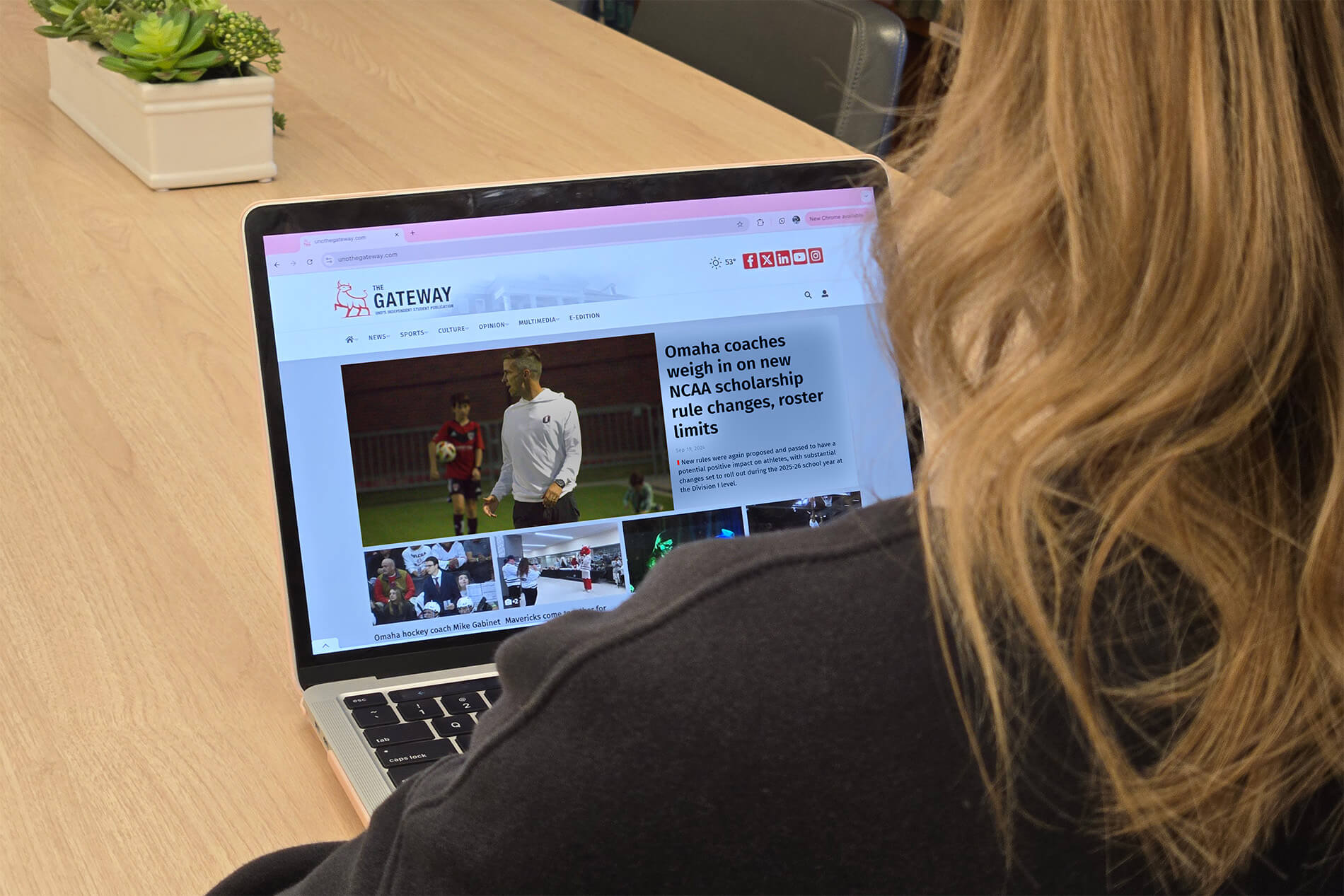
Support UNO's independent student publication with a gift of any amount.
We all know the news industry is not what it used to be, partially due to the rise of social media and disinformation. The Gateway — the University of Nebraska at Omaha’s independent student publication — remains a place for students to get credible and relevant news. And Wear Black, Give Back is playing a vital role in its continued success.
Over the past 102 years, The Gateway has taken on different forms. It has publication roots back to 1913, but it became a primary news source in 1922. “It’s run by students for the students. I don’t censor the student workers. It is truly their publication,” said Todd Cooper, manager of student publications at The Gateway.
Currently, the news industry is in a financial and existential struggle. Thankfully, The Gateway is partially funded by student fees and donor support.
“Advertising is spotty, so we rely on donations to ensure we have enough money to hire students to cover the campus.”
We take very seriously our need to be good stewards of the student fees we receive,” Cooper said. “The money is also used to expand their opportunities to tell stories in new and engaging ways through podcasts, videocasts and visual storytelling.”
Our donors are supporting a career path that is desperately needed, especially in a world that is full of disinformation. “From Wear Black, Give Back, we got a big donation from a person who has been around UNO and The Gateway for a long time. Then we got several small ones that added up to a big donation,” Cooper said.
“It was really cool and heartwarming. It makes you realize that there are so many people who care about students that have a future in this industry. They want students to succeed.”
“The new opportunities we get from donations are important because consumer preferences are always changing,” said Isaac Nielsen, editor-in-chief. “With our website, we are trying to draw readers in and keep them. Utilizing the new multimedia is a good way to accomplish this goal.”
“I am thankful for the donors supporting this desperately needed career path. There are not many objective news sources out there,” Nielsen said. “The Gateway can cover topics most news outlets can’t. These are topics that people want to know about.”
During this year’s Wear Black, Give Back, the Gateway received 41 gifts and raised $2,055. This money will be used to help achieve The Gateway’s main goal: to hold up a mirror to UNO to authentically reflect the campus. “I think our students’ reports should reflect the personalities of the students and the personality of UNO,” Cooper explained.
“We hope to continue to grow and put the donor financial support to good use by expanding The Gateway’s ways to tell stories,” Nielsen said.
Thank you to all the donors who participated in the Wear Black, Give Back giving day!
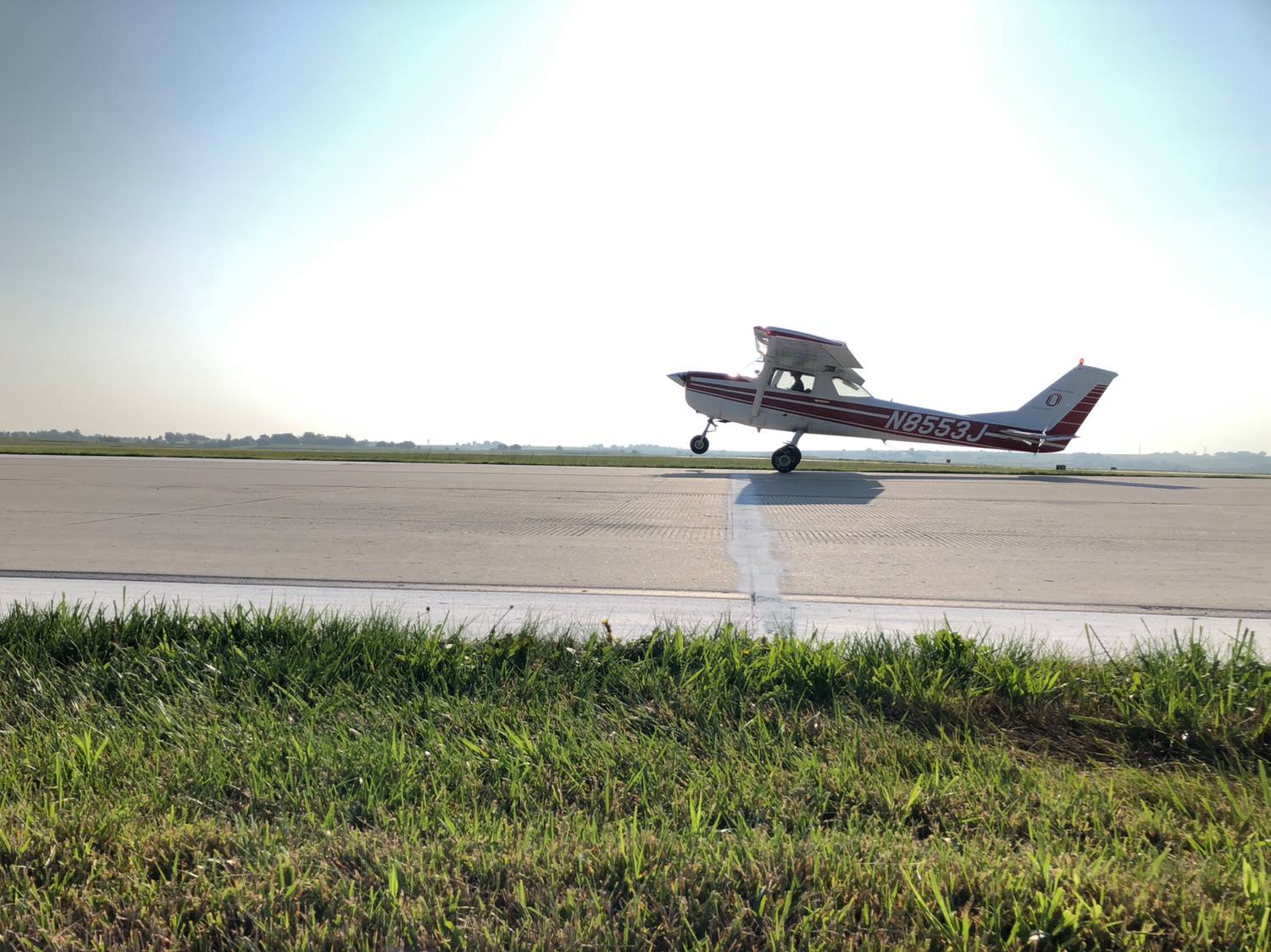
The CPACS Fund for Excellence helps meet the greatest needs of the college by providing crucial scholarship dollars to students in financial need, research awards to faculty, and travel support for students attending academic conferences, to name a few.
Support student organizations and programs like the Flying Mavericks Flight Team by making a gift to the Student Organizations Support Fund today.
Tyler Thieman’s eyes have always been in the skies.
The sophomore aviation student at the University of Nebraska at Omaha grew up with a passion for flight. Now a student in UNO’s College of Public Affairs and Community Service Aviation Institute and a co-captain of the Flying Mavericks Flight Team, Thieman has seen that love bloom into a fulfilling career.
Thieman’s dreams of flight began in Malcolm, Nebraska, as a fifth grader. He always had an interest in aviation, but it wasn’t until the summer before his senior year of high school in 2022 that those dreams became a reality.
“I woke up one morning and my parents asked if I had any plans for the day and I said ‘nope,’” Thieman said. “They told me, ‘Maybe you should go take a flight.’”
Thieman didn’t know it, but his parents were looking into local flight schools. After finding a school in Beatrice, Nebraska, they surprised Thieman with his first opportunity to take to the skies.
“I’m very fortunate that they gave me a little push,” he said. “I probably would not have pursued this career otherwise.”
Thieman arrived to a Cessna 152 parked on the runway. He took off inside the small two-seater with his instructor. Once in the skies, he got his first taste of flight.
“As soon as we lifted off the ground, the instructor handed over the controls to me,” he said. “It was crazy to me because I’d never even been in a small plane like that before, but I went with it.”
From that moment on, he was hooked.
“There’s just something about taking off and seeing the ground get farther and farther away from you,” Thieman said. “When I was in the front seat with the controls in my hands for the first time, that was the moment where I knew there was nowhere else I wanted to be. I wanted it to be my office for the rest of my life.”
Since then, Thieman has logged nearly 250 hours of flight time. Thanks to UNO’s Aviation Institute and his involvement in the Flying Mavericks Flight Team, Thieman is well on his way toward achieving that dream.
Thieman first heard about the flight team while touring the institute. At the time, he was hesitant to join the team because of the time commitment but was convinced to attend a meeting by his roommate and current co-captain.
“There is no way I would be involved in flight team right now if he didn’t get me out of bed to attend that first meeting,” Thieman said. “After that first meeting, I knew it was a place that was going to push me to excel as a pilot.”
The Flying Mavericks Flight Team is a recognized program in the National Intercollegiate Flying Association’s Safety and Flight Evaluation Conference (SAFECON). The team competes in a variety of aviation-based events, including aircraft recognition, computer accuracy and power on/off landings.
Skip Bailey, a retired lieutenant colonel in the United States Air Force and director of flight training in the Aviation Institute, oversees the flight team.
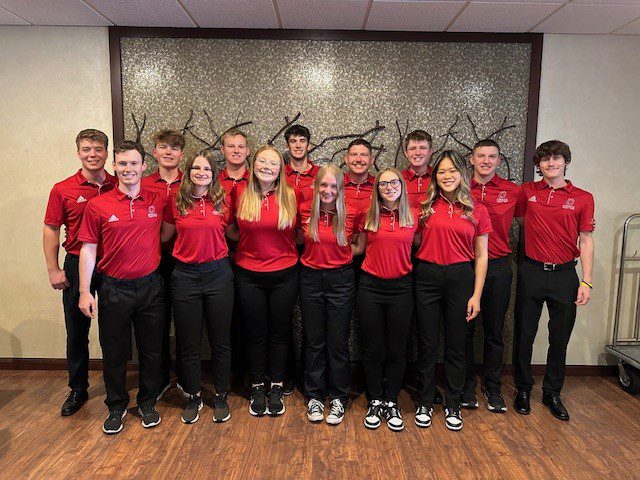
The program consistently attracts attention from students interested in all backgrounds of the aviation industry. The opportunity to provide students with this level of practical experience makes each meeting, practice and competition a rewarding experience, according to Bailey.
“I enjoy watching them succeed at all these different levels,” Bailey said. “It’s very rewarding to watch them when that lightbulb comes on after they succeed at an event. It’s very exciting to be around.”
Keeping the Flying Mavericks in the air wouldn’t be possible without the continued support from donors. Bailey said the program always strives to ensure its students aren’t footing the bill for any expenses while competing on the flight team, so he is grateful for any support the program receives.
“Our students pay enough with their own flight training outside of the team, so we really try to cover as much as possible,” Bailey said. “I am so thankful for the support we receive and want to thank all of our donors.”
When Thieman looks back on his time at UNO, he’ll remember the connections and relationships he developed thanks to the Flying Mavericks.
“We’re all very devoted and we want to be successful, so I think I’ll look back and be very thankful for the fact that we all pushed each other,” he said. “I’m lucky to be surrounded by people that want to help me reach my goals and know what it took to push me to reach them.”
Through this program, students can be part of a program that helps enhance their academic and professional abilities, all without having to worry about the cost.
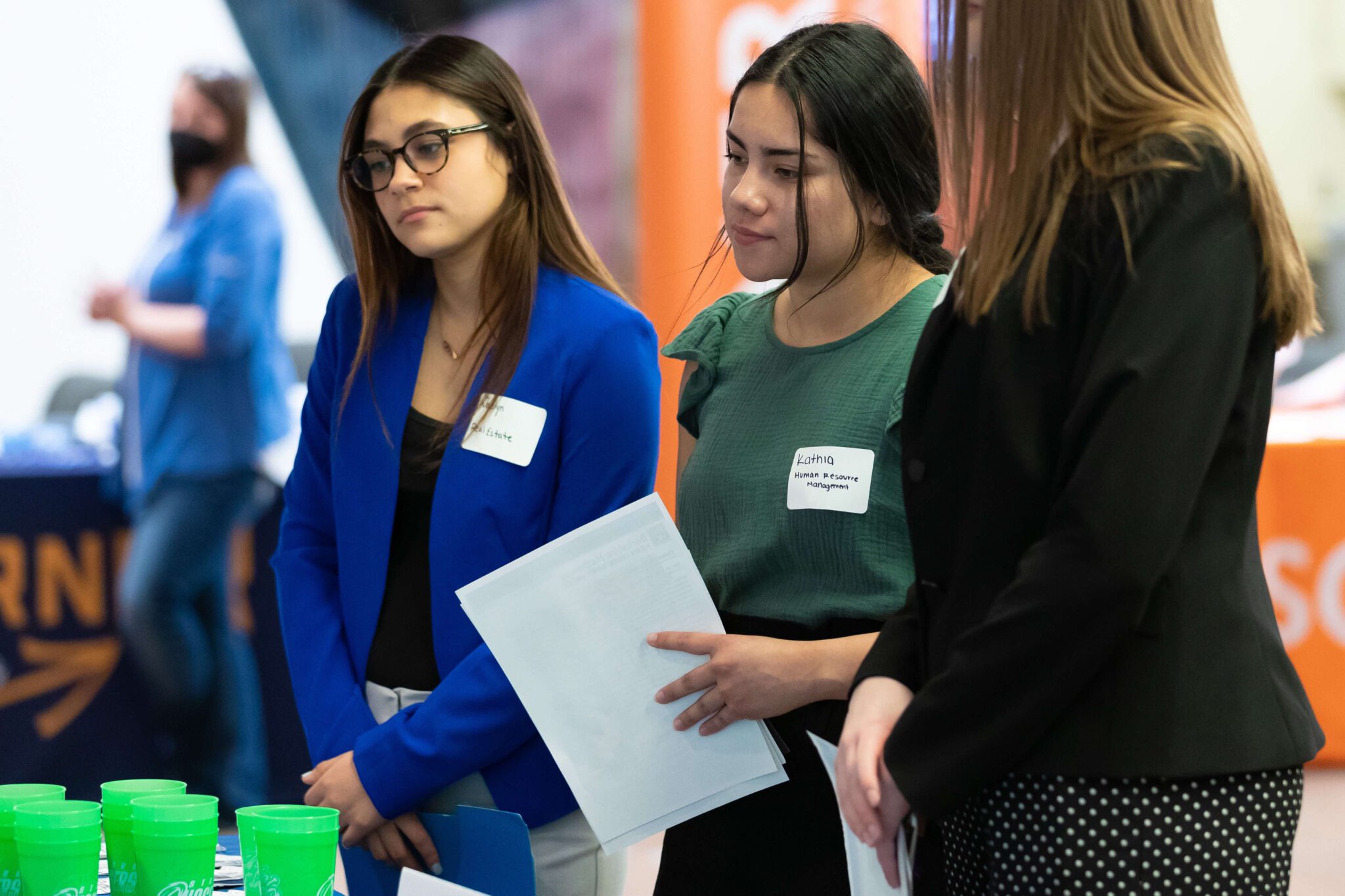
A gift to this fund provides needed general help to the College of Business Administration, enabling it to lend support to areas, projects and programs of greatest need.
Within the College of Business Administration at UNO lies a program that provides students with an opportunity to be a part of a high-achieving community, make connections and pursue their future goals. This program is made possible by the generosity of donors who fund students’ scholarships.
Bethany Hughes, director of the CBA Scholars Academy, has seen the direct impact of this program through the 10 years she has spent developing it.
“I came back to the College of Business after I graduated and then worked there for two years as an academic adviser,” Hughes said.
“In 2014, the university received a big donation to start the Scholars Academy, which I was then hired for.”
Relatively new to UNO, the academy has made an immeasurable impact on students and staff alike. Through this program, students can be part of a program that helps enhance their academic and professional abilities, all without having to worry about the cost.
Students are provided with the chance to gain professional guidance through mentorship, visiting businesses, making connections through their cohorts and even traveling abroad during their junior year.
“What has probably been the most impactful for students is the mentor program,” Hughes said. “Every student is matched with a mentor from the business community, and we have expanded it. They will meet with their mentor six times throughout the academic year.”
Students can gain practical advice from mentors who have real-world experience while expanding their own networks through them. A past student of the program now works at Renaissance Financial, all because his mentor reached out to an employee he knew at the company and connected the two.
Hughes continues to keep in contact with students who were previously involved in the program. The program has a 90% retention rate, which has led to continued participation even after graduation. She was able to match up a student studying in Germany with an alum and mentor in the program who is also living in Germany. The alumni of this program continue to stay in touch with each other years later, Hughes said.
Without the opportunity to join the CBA Scholars Academy, students would not have the college experience they yearn for.
“The Scholars Academy scholarship has provided me with the freedom to prioritize both my academic pursuits and extracurricular activities,” Logan Heger, a student of the 2022 cohort, said. “With reduced financial stress, I’ve been able to engage in various UNO organizations that have enhanced my personal growth. Additionally, I’ve had the opportunity to pursue internships that align with my future career aspirations.”
The CBA Scholars Academy would not exist without donors. And for some students, getting a scholarship through the program determines whether they can pursue higher education.
“When I can tell a student they were selected for a large scholarship that will cover their tuition and fees, that is special,” said Hughes
“They get to graduate without debt, which is setting them up for success after school and makes it possible for them to follow their dreams,” Hughes said.
To give more life-changing opportunities to students at the University of Nebraska at Omaha, please consider donating to the CBA Scholars Academy Fund today.
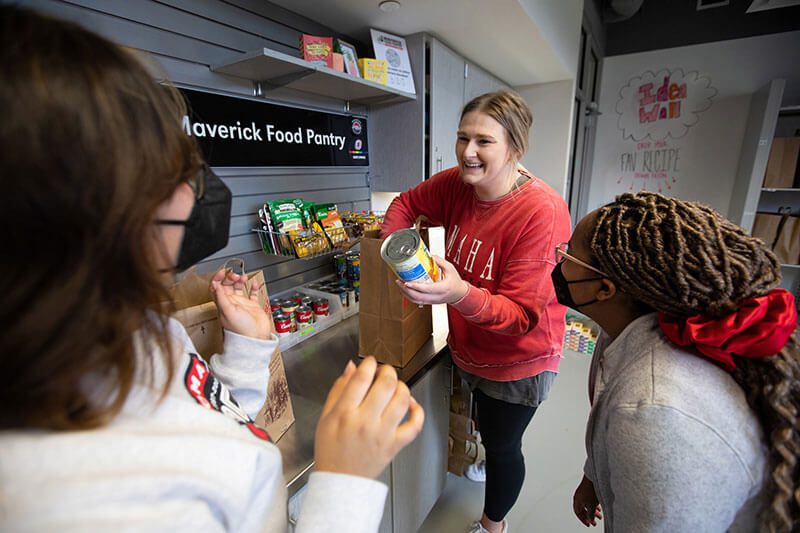
The UNO Student Hardship and Resiliency Fund supports students at the University of Nebraska-Omaha who are facing sudden hardship due to crisis situations.
College is hard enough.
Even under the best of circumstances, the academic demands and mental workload that come with pursuing higher education affect every student. When life gets in the way, those stresses compound.
Enter Durango’s Advancement and Support Hub. Located in the Milo Bail Student Center, DASH has served as a beacon of hope for students at the University of Nebraska at Omaha since its launch in January 2024.
For Rachael Jensen, executive director of DASH, each day provides a new opportunity to make a life-changing impact. Through its four pillars, DASH provides holistic support for its students, ranging from financial support and scholarship opportunities to providing basic needs and peer mentorship.
“One day, I had a student who needed to solve a $10,000 overdue balance and another student who was about to be homeless,” she said. “Our goal as a team is to think through all of the different pathways we can take to bring stability to these students. By discussing options in a nonjudgmental space, we get the opportunity to provide hope and empowerment – both key components for social mobility.”
A critical piece of DASH’s work is centered around educating the students who come through its doors, many of whom are first generation or come from a background with limited experience navigating higher education. In doing so, Jensen and her team are helping students overcome barriers and setting them up for long-term success.
“The crux of our work is making sure we are asking the right questions and helping our students connect with the resources they need on campus and in the community,” Jensen said. “A lot of our students are first-generation students, or they might have parents who went to college, but things have changed since then.”
The work is difficult and often begins with meeting students at a high stress point. However, to see them walk away from DASH with a plan for their future makes the work worthwhile, according to Jensen.
“We know that we’re doing something right,” Jensen said. “It’s so amazing that we’re able to give these students hope through the options provided through DASH.”
“We know that we’re doing something right,” she said. “We can see it when a student returns to celebrate their journey, reframing the struggle as a milestone.”
That hope can come in a variety of ways. Whether in the form of scholarships, several of which are funded through the University of Nebraska Foundation, basic needs or education, DASH is establishing itself as a crucial resource for UNO students.
“Every day is different, and every student is different,” said Madeline St. Clair, Maverick Food Pantry manager. “DASH is the connector – both to on-campus and to community resources. We are so grateful for Omaha’s vast philanthropic community.”
With such a diverse array of resources available to students, the need for support from donors is constant. By making a gift to support the services provided through DASH, Jensen said donors are planting seeds of change.
“Donors are giving hope without knowing who they’re giving hope to, and I think that is so impactful,” she said. “It’s like they have the seeds of wildflowers and they’re just throwing them in the air, allowing the DASH team to provide strategic care and watch them bloom.”
That support can change someone’s future. Jensen has seen it firsthand.
“Education changes futures,” she said. “Thanks to the support of our donors, these students see themselves as Mavericks. These donors are constantly giving hope, and because of that, our community is only going to get stronger.”
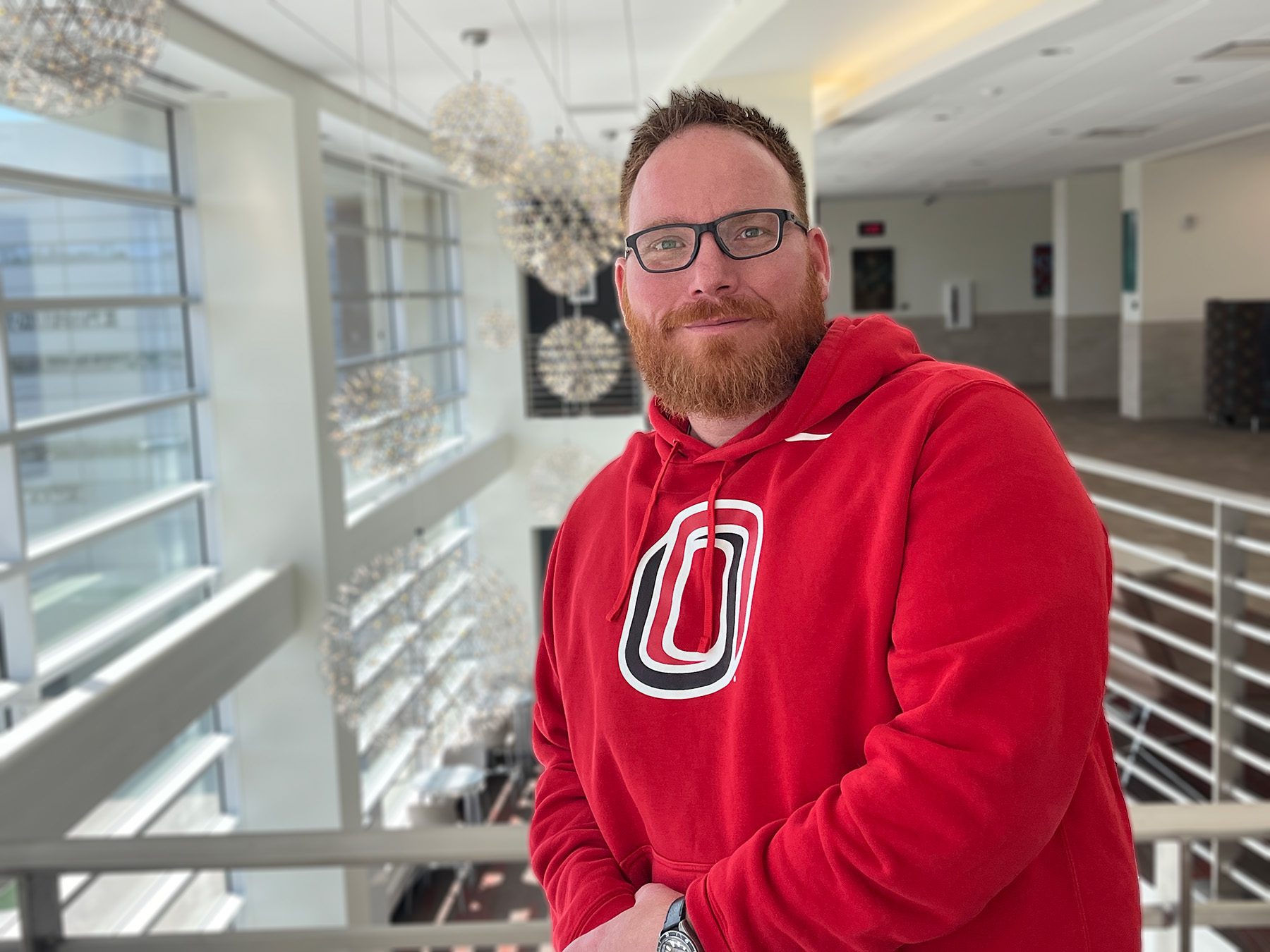
Support the next generation of accounting students at the University of Nebraska at Omaha by making a contribution to the UNO College of Business Administration Accounting Fund for Excellence. A gift to this fund provides needed general help to the College of Business Administration, enabling it to lend support to areas, projects and programs of greatest need.
Charles Castle knew he needed to make a change in his life.
The route for the 43-year-old accounting and business analytics major to the University of Nebraska at Omaha is a journey over a decade in the making. It’s a path that began with feelings of imposter syndrome that often accompany nontraditional students like Castle but will end with a life-changing degree through the education provided by UNO’s School of Accounting.
A Sidney, Iowa, native, Castle never had an interest in college after graduating from high school. Dreams of pursuing a career in the military were taken away following an injury while playing football, so Castle went to work.
Alcoholism followed Castle through his 20s. As he approached his 30s, Castle said he knew he needed to make a change.
“I joined a 12-step program and my life turned around,” he said.
Castle looked to move up at a local manufacturing firm, but knew he needed to receive an associate degree to be considered for the position he was interested in. So he began taking classes part-time at Metropolitan Community College in December 2016, while continuing to work full-time.
While at MCC, Castle’s desire to take his education beyond an associate degree began to grow stronger.
“I just thought, if I’m going to do this, why don’t I do something that I’ve always been intrigued by. I could probably have grinded it out at that job, but I wanted something that would keep challenging me.”
Castle found it through accounting. He always had an interest in the field as a student in high school, but never pursued the field further until he returned to the classroom.
“I took accounting in high school and it always interested me, but I never really applied myself when I was younger,” he said. “I told myself, ‘If I’m going to do this, why not do something that I really like?’”
Castle received his associate degree in general studies from MCC in May 2022. Just days after receiving his degree, Castle was enrolled in summer classes at UNO. Now as a full-time student, Castle immersed himself in everything offered by the College of Business Administration.
Organizations like Beta Alpha Psi, where Castle served as president, and Beta Gamma Sigma helped create an environment where Castle could feel welcome as a student.
“I’m transitioning from blue-collar factory work, I’ve never experienced a college campus before, and frankly, I’m old enough to be the father of some of my classmates,” he said.
“So sometimes I did struggle, but organizations like Beta Alpha Psi, along with some of the amazing faculty at UNO, really helped me feel comfortable here.”
The School of Accounting has also given Castle the hands-on experience necessary for success after graduation. This summer, Castle will begin an internship with KPMG — one of the four largest accounting firms in the world.
As a nontraditional student, Castle said he never would have expected to work at such a place this early in his career.
“You read about the Big Four accounting firms in your introduction to accounting classes, and all I could think about was ‘Oh my God, it would be so cool to work at a place like that,’” he said. “I think it also says something about the quality of this school. I don’t think it gets the credit it deserves.”
Castle plans to become a tax accountant after he graduates in May 2025. From there, he’s not sure where his career will take him.
While that may sound daunting for some, Castle is excited to make the most of the options and credibility that come with a bachelor’s degree from UNO’s College of Business Administration.
“One of the reasons I worked at the same place for over a decade is because that was the skill set that I had and it wasn’t really a transferable skill set,” he said. “Thanks to the university and those who support the School of Accounting, I have options now.”
2285 South 67th St
Suite 200
Omaha, NE 68106
800-432-3216
[email protected]